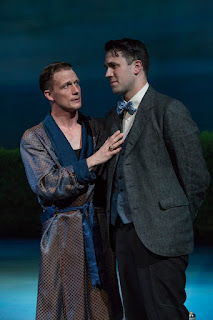IRT reweaves Fitzgerald's web of words in sensitive stage adaptation of "The Great Gatsby"
 |
| Straight-shooter Nick earns Jay Gatsby's trust. |
It's the right final touch in Simon Levy's adaptation of the F. Scott Fitzgerald classic, Indiana Repertory Theatre's season-opening production. Presented in this way, the title puts a seal on Nick's narrative, as if the upright young man's perception of Jay Gatsby could be summed up in a sudden inspiration and that any question of what greatness really is for Americans is best represented in a one-word highball mixing irony and genuine tribute.
Zach Kenney's forthright portrayal of Carraway — a hearty, circumspect, devoted narrator of Gatsby's mystery and undeniable stature — was winning from the start. I was a little worried when he swallowed the last word in Nick's initial description of Gatsby as someone "who represented everything for which I have unaffected scorn." The audience needs to hear that "scorn," and probably did (and will) at other performances.
Perhaps I am guilty of fetishizing Fitzgerald's words, but only because they are so respectfully treated in Levy's cunning stage version. At Saturday's matinee, Kenney consistently sounded their magnificent notes, however, while reflecting his character's decency, curiosity, and — considering the ambition Nick's brought with him from the Midwest to the glamorous East Coast — his humility.
Some things had to be jettisoned in the telling, of course. The novel, whose swift movement and concision are partly responsible for its being a required text for students too young to understand it, includes a back story Nick has been privileged to glean from his new friend.
 |
| Daisy Buchanan (Hillary Clemens) in her element. |
The omission of the mining millionaire and yachtsman Cody, even as a ghost, throws a little too much of Gatsby's romantic vision of himself onto his relationship with Daisy Buchanan, played with brittle, electrifying allure by Hillary Clemens. There's a lot of the farmboy Gatz's adolescent dreaming wrapped up in a more fundamental American idea: that the sky's the limit, that you can imagine your identity to start with, patting it together out of clay the way God made Adam, and then set about assuming it. And, yes, this imaginative grasp of your chosen destiny will often be nakedly materialistic.
Fitzgerald believed, not without irony, that shallow idealism was as worth serious attention as the more lofty kind. To take giddy joy in the trappings of wealth, as Gatsby, Daisy and Nick do in this show's marvelous riot among large racks of expensive shirts, is an entitlement worth defending.
That's why Daisy's husband Tom, a star college athlete who's morphed easily into a rake and snob, spouts off about the rise of "the colored races" in ways that are alarmingly perennial. When David Folsom as Tom first came onstage, I thought (as I did to a degree about the entire cast): "Wow — perfect!" As the title character, Matt Schwader projected command of those areas of Gatsby's life that made him highly regarded for a while as well as vulnerability in the one area where he felt defeated.
 |
| Nick (Zach Kenney) is wary as Myrtle and the McKees show themselves a good time. |
Teagan Rose displayed the sparkle and smooth self-regard of the celebrity golf pro Jordan Baker. Her troubled romantic fling with Nick was nicely judged under director Peter Amster's guiding hand. They are truly thrown together, as the romantically miserable Daisy has intended, but more by the magnetism of Gatsby, in and out of fulfillment, than by any real affinity.
A more ominous, imprisoning mismatch is that of the Wilsons, a grease monkey and his sluttish wife played by Ryan Artzberger and Angela Ingersoll like a sordid realization of the William Carlos Williams line "The pure products of America go crazy." Charles Goad and Constance Macy were vivid in a couple of secondary roles; their pairing as the McKees brings to the fore Fitzgerald's gift for sketchy satire. Goad also played the shady Meyer Wolfsheim, softened in this production (not quite justifiably) and frankly less reliant on an unsavory stereotype.
 |
| Conspicuous nonconsumption: Daisy, Gatsby, and Nick frolic among the shirts. |
H.L. Mencken, a champion of the brass-tacks realist and graceless stylist Theodore Dreiser, dismissed "The Great Gatsby" as "a glorified anecdote." A later social commentator named Bob Dylan nicely skewered the cluelessness of his straw man Mr. Jones by singing: "You've read all of F. Scott Fitzgerald's books, you're very well read, it's well known; but something is happening here and you don't know what it is, do you, Mr. Jones?"
Like IRT artistic director Janet Allen, I too have read all of F. Scott Fitzgerald's books. And I can wincingly appreciate Dylan's insight that Fitzgerald's view of life was a bit of a closed circuit (a phrase Mary McCarthy applied, more accurately, to J.D. Salinger). And that every age will find its own spokesmen with their own levels of insight into what matters and what warnings are worth delivering. But somehow Fitzgerald, throughout this book and more fleetingly elsewhere, managed to render his era with a magic and perspicacity that endures.
This production of "The Great Gatsby" is worth seeing for that reason. And it will return you to the book, which ends in a wise blend of nature and history and dreaming. That beautiful last page may even make you weep, as Carraway recalls the Dutch sailors who first explored for the sake of white European restlessness the landscape Gatsby was to briefly triumph in, when "man must have held his breath in the presence of this continent, compelled into an aesthetic contemplation he neither understood nor desired, face to face for the last time in history with something commensurate to his capacity for wonder."
http://jayharveyupstage.blogspot.com/2013/05/cashing-in-on-voice-full-of-money.html
http://jayharveyupstage.blogspot.com/2013/05/money-honey-what-happened-to-daisy.html



Comments
Post a Comment